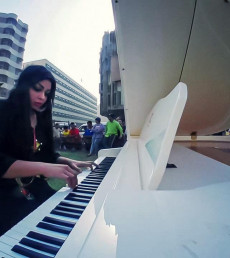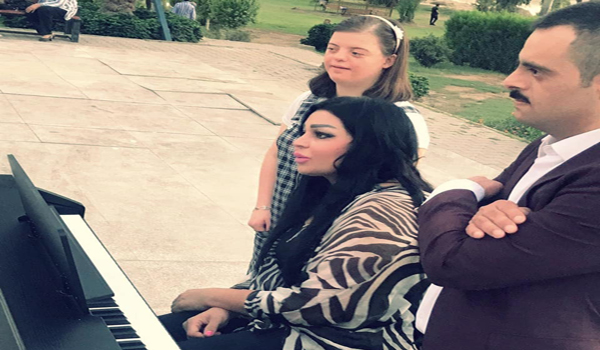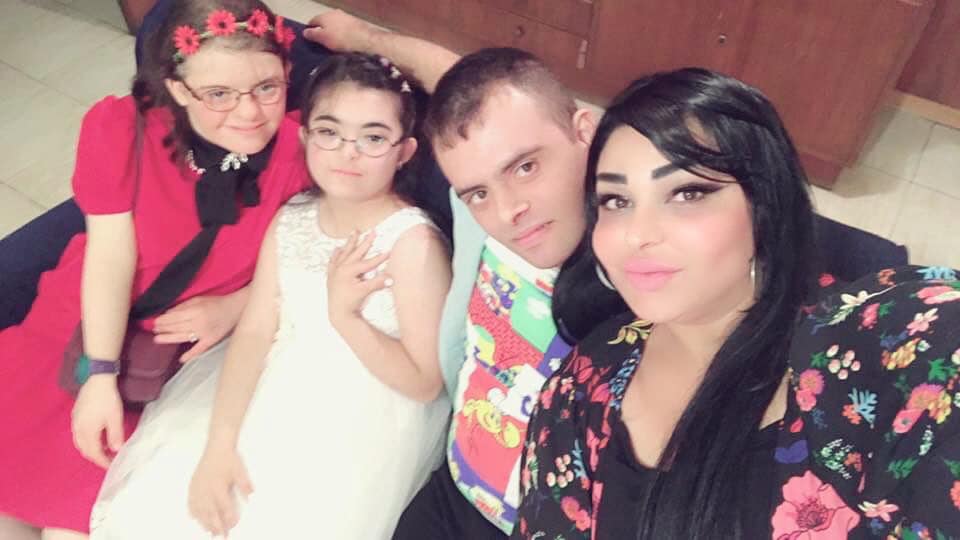
By Wiroud Saleh

By Wiroud Saleh
Rana Jassim has made her way as a piano plyer and music composer to become a star in a male-dominant society but her talent twisted with academic studies paved her way to success.
Jassim had a chance to take a course in the Unites States and get a certificate which pushed her to establish an institute for teaching music to children with Down syndrome, using her skill to reveal theirs as a natural therapy compared to clinic and chemical therapy.
“I was only four -years-old when I started playing Piano with no professional instructor but I liked it and was training till I managed to plan a folk song,” Jassim told KirkukNow.
I was only four -years-old when I started playing Piano
She has developed when she became six and could play a popular song for Iraqi singer Nazim al-Ghazali. When she turns 15, she joins music department of Baghdad Fine Arts Institute. She picks Piano as the musical instrument and learns all the basics at the hands of the artist Sa’ad Mahmood Hikmat.
In 1999, she graduates and gets her Diploma with high marks allowing her to join the college of fine arts in University of Baghdad. She gets bachelor degree in music in 2003.
She was appointed there as a assistant lecturer and has become a member of Iraqi national committee for music. Currently, she is in charge of art activities department in the presidency of Baghdad University.

Baghdad- Jassim plays piano with kids in the square of al-Khilani
Compositions and festivals
Jassim has represented Iraq in many international music festivals and events such as World Music Festival in Opera House of Cairo, Monteux Music Festival in Paris and operas in Netherlands and Belgium and the celebrations of Iraqi community in Sweden and Norway.
She is an active member of Sumerian Melodies group. She also has got enough experience to compose music for shows, dramas and documentaries produced by media department of University of Baghdad.
Her most prominent compositions are My Coffee & the Rain, Truthful Lies, The Wish presto, Day Dream, A Letter to Someone.
New York Studios
Post-graduation, Jassim has joined a US program in coordination with the Iraqi government called “Community Leaders” for skillful people.
“As my expertise is music, I got a degree in using music in medical therapy. I also had the chance to play piano in Yamaha Studio in New York where I played an Iraqi folk song,” Jassim delightfully recalls her trip to the US.
Music as Therapy
“When the program was over, I could use it on the ground as therapy for kids affected with Down syndrome . I turned some of them into professional piano players,” Jassim enthusiastically talks about her project in Baghdad.
Down syndrome or Down's syndrome, also known as trisomy 21, is a genetic disorder caused by the presence of all or part of a third copy of Chromosome 21. It is usually associated with delays in physical growth, mild to moderate intellectual disability IQ, and obvious facial features. The average IQ of a young adult with Down syndrome is 50, equivalent to the mental ability of an 8 to 9-year-old child which varies widely.
The positive feedback motivated her to establish an institute to teach piano lessons to affected kids “as music is soul nutrition” yet she has not received any support from the relevant authorities, art institutes or NGOs.

Jassim with a number of her students teaching them playing piano.
She is delighted that three of them have turned into professional piano players.
“Music is the most curing therapy compared to clinical and chemical therapy because you are turning the character of an ill person into an innovative artist, the cure itself.”
Music is the most curing therapy compared to clinical and chemical therapy
Enemies of success
The player, composer and teacher is proud of the support from her family which made her stand in the face of bullying and prejudice she faces in her daily life.
“The lights I attract as a player generates bullying that passes my career and intrude into my private life.
She recalls that once she was invited by a page on social media to play live music and all the feedback was about her face, attire and body and few listened to the music she was playing.
“Bullying has turned into a social phenomenon and it’s not easy to overcome as those who failed find it interesting to target any one climbing the stairs of success.”